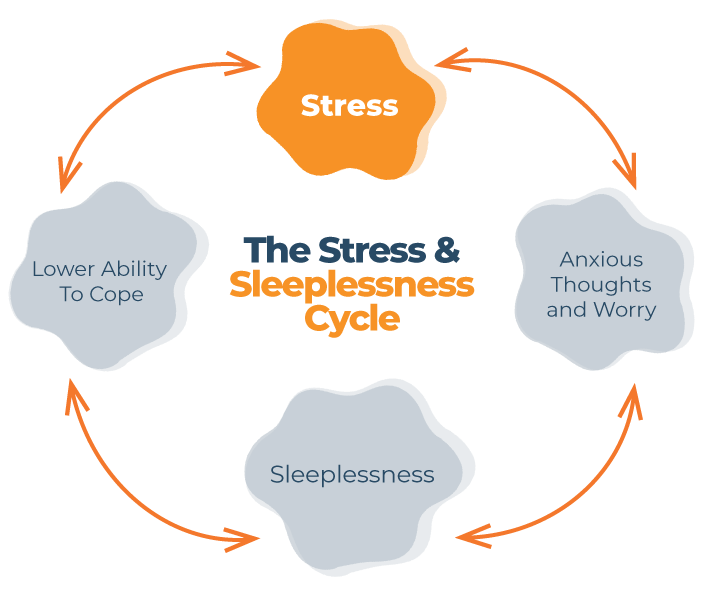Do you ever go to bed saying to yourself, “Tomorrow is the day that I’ll wake up when the alarm goes off”, and then the alarm buzzes as you fumble around looking for the snooze button? Maybe you put the alarm across the room to encourage you to get up, but for whatever reason, you can’t seem to bounce out of bed.
Your body clock may be out of sync, making it more challenging to stick to a regular schedule. Whether you’re staying up too late, struggling to get out of bed in the morning, or both, this article will give you helpful tips to fix your sleep schedule.
Why Our Sleep Schedules Get Thrown Off
Many of our biological functions, including sleep, are controlled by our internal body clock, also known as a circadian rhythm. This 24-hour cycle gives the body cues about when it’s time to eat, sleep, digest food, etc. Just about every organism has one, though some species don’t have the same 24-hour schedule that humans do.
Two vital forces help set the biological clock:
- The light and darkness in your external environment
- A genetically programmed internal memory
Despite its importance, there is a myriad of factors that can throw off a sleep schedule1. They include:
- Doing shift work
- Drinking alcohol
- Sleeping with disruptions (like a restless partner, kids, animals, etc.)
- Sleep apnea
- Snoring
- Jet lag
- Temperature changes in the bedroom
- Hormonal changes
- Stress
- Certain medications or drugs
- Changes in light – like staying up late with the lights on or staring at a screen
While resetting your schedule isn’t going to occur overnight, it might not take as long as you think. Here are 10 tips to help you get back on track.
Learn More: Sleeping Habits to Avoid
Tips to Reset Your Sleep Cycle
If your circadian rhythm is messed up or off in some way, chances are, your sleep schedule will be off as well. This is because your circadian rhythm2 tells your body when to start producing melatonin for sleep and when to start producing cortisol to wake up. If the timing of these hormones is off, it can have you going to bed too early, too late, or waking up too early or too late.
The best thing you can do to fix your sleep schedule is reset your sleep cycle. This will take some time, but with consistency, your body will catch up to your new routine, and begin producing the sleep and wake hormones at the right times.
1. Stick to a Routine
The most effective thing to do is to have a set time that you go to bed each night. Then plan to wake up at the same time each day as well. So, if you decide that 10:00 p.m. is your desired bedtime, you should try to go to bed at that time every night.
Having a bedtime ritual can help signal your body that it’s time for bed when you’re not feeling drowsy yet. This could be as simple as brushing your teeth and washing your face, or you may prefer a more elaborate routine to wind down and train your body that the day is ending.
2. Make Mornings Bright
If you wake up in a dark bedroom, your internal clock may not register that it is daytime. So, first thing in the morning, make sure your room is well-lit. Look out the window or go outside so you can experience some sunshine. If it’s winter or cloudy, bright lights in the home can help brighten your morning.
If you are one of the many people who rely on curtains or blinds to block out light at night, you might try pulling the blinds or curtains but leaving a slight crack so that in the morning, sunlight can get in. If this isn’t an option for you, there are sunrise alarm clocks that will act like the rising sun
Find Out More: The Importance of Morning Sunlight for Better Sleep
3. Keep Nights Dark
Modern society makes this step more tricky. Most of us are used to screen time after dinner, whether it’s watching television, working on a computer, or browsing emails and social media on a smartphone. The key is to eliminate these lights when it draws closer to bedtime and keep these devices out of the bedroom.
The reason screens, in particular, affect the circadian rhythm is that they produce what is called “blue light.” Blue light (from screens) and white light (from certain light bulbs and the sun) are the most disruptive3 to the production of melatonin, the hormone that responds to darkness and tells your body to get sleepy.
The best thing you can do is stop looking at screens at least one hour before bed and turn off the lights in your home. If you need light, use dim, red, or even natural light like candles. These will allow you to start winding down at night. If you prefer to watch a movie until you get sleepy, you can try blue blockers – glasses that block out blue light so that your circadian rhythm shouldn’t be disrupted.
Also, if there is light outside of your bedroom window at night, like in many urban areas, you can get blackout curtains or use an eye mask if that’s comfortable for you.
4. Exercise Regularly
Exercise is one of the most important parts of mental and physical health, and this includes helping you get better sleep. Moderate to vigorous exercise helps increase sleep quality and decreases the time it takes for you to fall asleep. Not only that, but it increases the amount of slow wave sleep4, or deep sleep, you’re getting. That’s the all-important part of sleep where your body and mind have a chance to recover and rejuvenate. Exercise also naturally helps stabilize your mood and calm your mind – important factors in the ability to fall asleep4.
In addition, exercise is key to maintaining a healthy body weight, which can be useful in getting good sleep as well. In fact, 70 percent of moderate to severe cases of obstructive sleep apnea have been attributed to obesity5.
As far as the time of day, some studies say that morning workouts are the best6 for sleep, whereas others suggest that evening exercise is better7.
Ideally, you should find a moderate to vigorous exercise that you enjoy doing for at least one hour a day and see which time of day works best for your overall energy and sleep at night.
Learn More: Timing Your Sleep and Exercise
5. Keep Naps Short
Resisting naps is hard, but a long nap could signal the internal clock that you’ve slept for the night, making falling asleep at bedtime a struggle.
Therefore, we suggest limiting naps to 20 to 30 minutes. That’s long enough to help you feel refreshed but not so long that they plunge you into a deep sleep.
For More Info: 9 Different Nap Types
6. Reduce Caffeine & Alcohol
Some experts will say to avoid caffeine altogether, but that seems excessive. Instead, we say feel free to enjoy your regular cup of coffee in the morning but abstain from caffeine as the day continues, stopping your intake entirely within six hours of bedtime.
Along with caffeine, alcohol has a negative impact on sleep. Even though alcohol is meant to have a “calming” effect, studies8 show it can cause a variety of sleep issues including insomnia, daytime sleepiness, and altered circadian rhythms. There aren’t any health benefits9 to regularly drinking, so if you can stop, that would be best. If you don’t wish to stop drinking entirely, try to at least cut back or take a break from it and see how your sleep changes.
Interested in exploring further? Read more about caffeine’s effects on sleep here.
7. Try the Right Sleep Aid
Prescription sleeping pills can be good short-term solutions for things like jet lag or a particularly stressful circumstance. However, when you’re trying to get your internal clock on schedule, these could do more harm than good.
If you find that it’s a challenge to fall asleep during this reset period, reach for something natural, like melatonin supplements. Melatonin is a safe, non-habit-forming, and natural supplement, and as mentioned earlier, the body produces the melatonin hormone to signal the body that it’s time to go to sleep.
Those with circadian rhythm disturbances might not be producing enough melatonin or could be producing it too early or too late, so their sleep cycle is off. Taking 1-3 milligrams of a melatonin supplement about 2-3 hours before bed could help reset your body’s circadian rhythm.
Additionally, magnesium is found to be a relaxing supplement that could help people sleep better at night. However, if you find that melatonin or magnesium gives you daytime drowsiness, simply reduce your dosage.
View Our Guide: Best Natural Sleep Aids
8. Go Camping
Grab your tent, leave your laptop behind, and head to the great outdoors. By going camping, you eschew most of the distractions (and bright lights) of modern society so you can reset your biological clock with relative ease.
A 2017 study10 showed that going camping for just two days (a quick weekend trip) shifted participants’ melatonin rise to time 1.4 hours earlier. This is a significant amount of time, especially considering the participants were gone for just two days. Not only that, but when the participants went home, they maintained their camping sleep schedule.
Without being thrown off by artificial light, their circadian rhythms were naturally able to get back on track and lengthen and align with natural darkness and with the season – as it does, by the way, with all other animals.
9. Don’t Stress
Though it can be a challenge, you should do your best to avoid stress as you go to sleep. The truth is, there’s not much you can do about these worries at 2:00 a.m. from your bedroom. If you genuinely can’t let go, write down what’s bothering you or make a to-do list to reference in the morning. Sometimes, just getting the frustrations or task lists out of your mind and onto paper can make falling asleep easier.
We understand that letting go of stress is easier said than done. So here are some practical tips for those of you who struggle with stress or anxiety before sleep:
- Meditate – Set a timer for 10-15 minutes and sit still, noticing your breath and body. Your thoughts won’t just suddenly stop, but you can try to notice them without judgment.
- Do a body scan – Start with the tips of your toes, then move up through your feet and eventually all the way up to the top of your head and the tips of your fingers. As you move through each part of your body, in your mind say, “My [toes] [arms] [etc.] are completely relaxed.”
- Journal – If you have a lot of thoughts before bed, write them all down in a journal. As mentioned above, getting your thoughts out onto paper could be what you need to finally relax.
- Drink something warm and calming – Chamomile tea or warm milk are popular examples of relaxing nighttime drinks that could help you calm down.
- Read a book – The type of book is important, though. Try to read something uplifting and avoid content such as thrillers or horror novels, as these could further stimulate the mind or cause nightmares.
Experts recommend treating the bedroom as only a place for sleep11. So, if you can’t sleep, rather than lying in bed worrying about not being able to sleep, get up, go to another room, turn on a low/dim light, and do something relaxing until you feel sleepy. Then, go back to the bedroom and go to sleep.
You can repeat this if you wake up in the middle of the night with anxiety.
Check Out Our Guide: How to Cope With Stress and Sleep
10. Seek Professional Advice
Suppose you’ve tried everything – melatonin, magnesium, meditation, getting up when you’re restless, going to bed when you’re tired, getting outside in the morning – and still have no luck, it might be time to call in the professionals.
A psychologist might be able to help you with underlying issues (like anxiety, which is very often associated with insomnia) and help you find a long-term solution for better sleep. A doctor can help diagnose if your sleep issues are related to some sort of medical condition (fluctuating hormones, a thyroid issue, etc.)
Cognitive Behavioral Therapy12 (CBT) is also an option. This medication-free tactic addresses behaviors and thoughts that cause insomnia and has been shown to be extremely effective for all types of people.
Does Pulling An All-Nighter Reset Your Sleep Cycle?
You might have heard the rumor that pulling an all-nighter can reset your sleep cycle. This should be put down with other myths like “gum will stay in your stomach for seven years” or “coffee stunts your growth.” Basically, no, pulling an all-nighter won’t reset your sleep cycle.
Intentionally pulling an all-nighter will probably do your sleep cycle more harm than good because staying up all night one night does not guarantee good sleep the next night and can lead to a cycle of bad sleep. Plus your day will be shot, as staying awake all night significantly reduces cognitive function13 and negatively affects physical and mental health, both short-term and long-term13.
Have You Gone Without Sleep?
Symptoms of a Broken Circadian Rhythm
Being sleepy is the most notable symptom, but there are others, too. These include:
- Insomnia (difficulty falling or staying asleep)
- Excessive daytime sleepiness
- Difficulty waking up in the morning
- Sleep loss
- Depression
- Anxiety
- Stress in relationships
- Poor work/school performance
- Inability to meet social obligations
Having an inconsistent sleep schedule can also lead to something called circadian rhythm sickness14.
Here is a list of symptoms:
- Sleepiness
- Nausea
- Memory loss
- Depression
- Metabolic syndromes and weight gain
Again, the circadian rhythm controls a variety of biological functions, not just sleep. Therefore, adjusting it in a way that isn’t consistent with natural patterns can cause a long list of issues and ailments.
Conclusion
There’s no pre-determined length of time that will predict how long it will take to fix your sleep schedule. It’s going to depend on how “off” it is and how long it’s been that way. Most experts say to plan for two weeks up to two months for your new habits to set in. Once you are back on cycle, follow the tips included here to stay on track.

Olivera Jancikin
Content Writer
About Author
Olivera is a content writer for Sleep Advisor and is enthusiastic about sleep. She firmly believes in the benefits of daytime naps on top of getting a full 8-hour sleep at night.
Combination Sleeper


